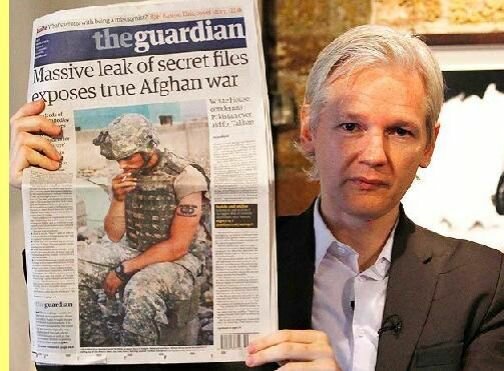
 Print This Post
Print This Post  Email This Post
Email This Post
Spinning The Leaks, Guardian Style
- How Guardian Is Twisting The Leaks For Propaganda That Suits US And UK Policies
Read The Cables, Not NYT And Guardian’s Biased Translation
We should get used to looking at the cables themselves, and not letting the Guardian or anyone else (including Wikileaks if it comes to that) interpose themselves. That really is one of the most amazing things about Wikileaks – not that it gives the data to the Guardian, but that it gives the data to anyone. That is part of the reason that there is this unbelievable global persecution of Wikileaks going on (and not, for example, of the Guardian).
JUSTIN BODUR | Saturday | 11 December 2010 | viewpointonline.com
WWW.PAKNATIONALISTS.COM
TORONTO, Canada—My daily routine these days includes going to the Wikileaks twitter feed (), which took me to this story in the UK Guardian about how Saudi Arabia proposed an Arab force to invade Lebanon. The Guardian is definitely the best site on the Wikileaks, and for data in general – they have understood something about what media organizations should be doing and they are going about it, in ways that a lot of other outlets haven’t.
Having said that, this piece is an example of spinning the Wikileaks that people should be warned about. I really think we should get used to looking at the data itself, and not letting the Guardian or anyone else (including Wikileaks if it comes to that) interpose themselves. That really is one of the most amazing things about Wikileaks – not that it gives the data to the Guardian, but that it gives the data to anyone. That is part of the reason that there is this unbelievable global persecution of Wikileaks going on (and not, for example, of the Guardian).
The first problem with the Guardian piece is that they don’t follow the rules that Wikileaks wants the rest of us to follow. Why not? Wikileaks asks on the cablegate site a pretty simple thing: that the cable be cited with a tag. In this case, the tag is #08RIYADH768 and the cable itself is here. I will concede that I didn’t look in every nook and cranny but I didn’t see either the tag or a link to the cable on the Guardian’s site. Why not?
In this case, the story by Ewen MacAskill reports the cable accurately, which is good, but then provides the following for context:
“The discussion came just days after Hezbollah and other pro-Iranian and pro-Syrian groups in Lebanon laid siege to Beirut, threatening the pro-western government of Fouad Siniora, after 17 months of street demonstrations.”
Here’s where the problem is. In some contexts, the idea of a siege is a useful metaphor (perhaps Toronto in the summer of 2010 with Harper’s billion dollar police siege of the city). But this is Beirut, which has been under actual siege. As in, sealed off to the world. As in, shelled from the hills. It was besieged repeatedly, by the Israeli military, many times over the past few decades. In that region, there is a real siege going on, again, a real siege, as in, surrounded by a military that doesn’t allow people or goods in or out, again by the Israelis, this time in Gaza. There was a lot going on between Hizbollah and the Lebanese government in 2008, but it was not Hizbollah “laying siege to Beirut”.
Wikileaks is doing an immense service by putting the data in the public domain, and the Guardian have been among the best of the mainstream media in using it and helping people understand it. But when the leaks get spun, it’s a reminder that people need to look for themselves. In this case, it’s not about looking at the data so much as looking at the history – but the principle still holds.
Wikileaks are not the truth:
The US Embassy cables put out by Wikileaks are not the truth. Even though I knew it, a part of me was disappointed at how ideological some of the cables were. Take #09TELAVIV1060, “Rep. Wexler discusses Iran with IDF Intelligence”. The entire discussion is about the threat posed by Iran to Israel. Even among themselves, even when they think their communications are secret, they engage in fear mongering. Much of the cables are this sort of exchange of opinions. It is only when these opinions are given to journalists at press conferences or in anonymous phone interviews to become “US officials said” that these kinds of speculations take on the appearance of facts.
For those paying close attention, the views expressed in the cables belong to the same world view that these same officials express in the media. Following events in Israel/Palestine without any access to any secret cables, one would be led to the conclusion that the US and Israel have the same kinds of obsessions (control of the region, Iran) with very minor differences between them (none of which differences benefit the Palestinians). So, when the Tel Aviv Embassy (#09TELAVIV1060) cables that “Rep Wexler stated that he expected Israel would be pleasantly surprised by the President’s acceptance of all possible options in regards to Iran”, it isn’t a big surprise.
At times, however, the cables do show that US diplomats sometimes have an accurate understanding of situations – which the US proceeds to not use. For example, #09ISLAMABAD2295, relating to the US desire to fight al Qaeda in Afghanistan and in Pakistan’s border areas. “Increased unilateral operations in these areas risk destabilizing the Pakistani state, alienating both the civilian government and military leadership, and provoking a broader governance crisis in Pakistan without finally achieving the goal.” Of course, the US response since has been – increased unilateral operations in those areas, which have destabilized the Pakistani state, alienated the civilian government and the military leadership…
So, the data aren’t going to reveal that the US was actually trying to act benevolently in the world, nor that the US actually tells the truth in its dealings with its own public or with other countries. They aren’t going to reveal that US Embassies don’t spy or plot coups. Instead, they will show just what US officials have been up to, what they have been thinking, and what they have been reporting for years, most of which could be inferred by the effects of the actions and by reading between the lines of their stated claims.
Why, then, has the US (and Australia and Canada, with people like Tom Flanagan ready to make ugly statements on behalf of the powerful) seemingly up and lost its mind over this, with the suspected leak Brad Manning in jail with politicians calling for his execution and Wikileaks founder Julian Assange on the run (with people like Flanagan flippantly calling for him to be killed)?
The claims that the information “puts people at risk” are preposterous and have been answered many times over (the people who show such concern over putting people at risk include those who ordered the mass murders that are recorded in the relevant databases). Should states be allowed to keep such things secret? Why? Because they know better than the people? If they do, shouldn’t our access to their secret data lead to us admiring and respecting them more? And if it doesn’t, shouldn’t they be able to explain why, give us the context we are missing? Or is the implicit argument that they are so vastly smarter than we are that we just can’t understand why they have taken these decisions – on our behalf? That is a pretty insulting idea, but without it, the case against the leaks falls. Either their decisions can hold up to scrutiny or they can’t. A look at the data itself is the best way (perhaps the only way) to see the falsehood of the “national security” pretense. The value of that line of argument depends on us not knowing and not being able to find out. One positive outcome of these leaks could be that more people don’t buy the “national security” idea as a reason we don’t have the right to know things.
But if it isn’t out of some kind of legitimate safety concern, why is the US and its allies trying to punish the publication of information as if it was a crime on par with their aerial bombings and financial destruction of economies? The indispensable Jonathan Cook writes that the fact that the leaks happened, as well as the content of the leaks, give the “impression of a world running out of American control”. I think the implications might potentially be even greater than that. What if these leaks set the precedent that governments cannot keep their information secret? That whatever they do, they have to do openly and under scrutiny? That data on their actions is going to be available and analyzed? A great deal of what the US has done that is revealed in these leaks (the Afghan War Diary, the Iraq War Diary, and the Cablegate Cables) after all, it has done openly and with the consent of at least a plurality of its population. So why keep some of it secret? Perhaps because it feared that if the information wasn’t secret, it wouldn’t be able to get away with it. That is an encouraging thought. Governments should fear doing things they can’t justify, and people should have the information to know what they are doing. If the US can take Wikileaks down and terrify others who might try the same, a very interesting moment will be lost. Defend the leaks and use the data.
Postscript:
I spent some time (and plan to spend more) looking at the Iraq War Diary data. My impression was that the redaction was excessive. The cablegate cables don’t look overly redacted, which is positive. I hope the unredacted data are released eventually. I am not sure about Wikileaks’s release strategy of a few hundred a day as opposed to the full dump. I understand that there’s so much data that it will be hard to do it justice, but given the intensity of the attack Wikileaks is under, I do fear that the full cables may not see the light of day before the US is successful in stopping it.
Justic Podur is a professor of environmental science at York University in Toronto. He is also a political activist who participated in events in places as far as Gaza and Latin America. Reach him at This e-mail address is being protected from spambots. You need JavaScript enabled to view it This op-ed was published by
© 2007-2010. All rights reserved. PakNationalists.com
Verbatim copying and distribution of this entire article is permitted in any medium
without royalty provided this notice is preserved.








Leave a Reply